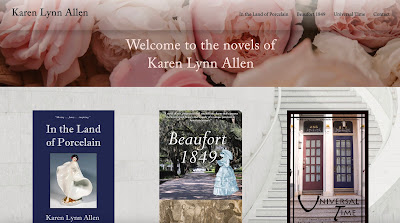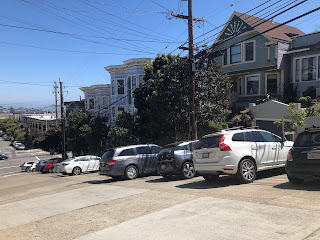Imagine that as a child you were issued a large backpack to wear at
all times. At first you didn’t know what it was for, but then the adults around
you started putting rocks in it that you then obediently carried around. After a while you followed their example and began
to put rocks in there yourself. Over time, some of the rocks disappeared, but most
didn’t, and by now that pack’s really, really heavy.
You often pull out
some of the rocks and look at them. They don’t make you happy. In fact they
make you miserable. Some at the bottom you never pull out—you might not even
remember you have them--but still you carry them. This seems inexplicable. Why
would anyone voluntarily bear such a burden?
Unfortunately
these rocks are not chunks of shale or granite or sandstone. Those would be
easy to get rid of! Instead they are bits of residual resentment, hatred, anger,
guilt, and shame from injuries or injustices or mistakes you can’t or won’t or
haven’t tried to let go of. The backpack is your mind; the weight of the load
burdens not your back but your soul.
What follows are
tips for cleaning out that backpack. If the pack’s stuffed full, it’ll take
some mental elbow grease to do a good spring cleaning, but trust me, it’s worth
it for the sunlight that will pour into your life. After that, there’ll be some
ongoing maintenance to keep your pack light and your steps jaunty. Yes,
there’ll be surprises. Rocks that you’ll swear you never picked up will somehow
get in that backpack, and a few rocks will keep reappearing even after you put
them down and down again. Still the effort’s worth it.
So how to get rid
of these rocks? The first step is to realize that anger, hatred, resentment,
guilt, and shame are not just weight, they’re toxic, poisonous to a healthy
life. They cloud your judgement; they sap your attention and energy. They
lead to bitterness, depression and despair. If you feed these toxic emotions,
the rocks will grow until they’re all you have left. At its most basic, carrying around these rocks is a form of self-harm.
Instead when these
emotions arise, acknowledge them, learn from them. Take action if appropriate.
And then let them go. This doesn’t mean you should allow people who’ve injured
you to do so again. But caution, wisdom, and courage prevent injury better than
anger and resentment.
Back to spring
cleaning. All of us have childhoods that involved rocks. Some of us had really
bad childhoods with backpacks that are overflowing. I’m so sorry. Our families
and our society should treat children so much better. But if you’re
reading this, you’re likely an adult with a lot more control over your life now.
Carrying a heavy psychic backpack helps nothing.
The first rocks to
get rid of are those pertaining to parents. You can forgive or not forgive, but
either way the weight’s killing you. You have to let go. One way to do this is
to imagine your five-year-old self. What do you need? What do you wish you’d
gotten? More love? What would that look like—more hugs, more safety, someone to
read to you at bedtime, someone to tell you you’re wonderful? Whatever it is,
imagine your adult self taking your child self by the hand and giving them
whatever they didn’t get. Yes, this doesn’t seem rational, but the inner child
in you isn’t rational, just needy. Re-parent yourself. Take five minutes here,
five minutes there and imagine giving that five-year-old what he or she needs.
 |
It's big. It can take it.
|
When that five year
old is calm and happy, slip him or her gently into your heart for safekeeping. (If there was another
time in your life when you were especially needy, say as a teenager, then do
the same for that self.) With your child selves safely tucked away, imagine
standing at the rim of the Grand Canyon. It’s so vast, so deep, it
can absorb and neutralize all the negativity you have to give it. Then imagine dumping out your
whole backpack over the edge. Not all the rocks will fall out. Many will stick.
Over the course of the next month, take these stuck ones out one by one as they
arise in your mind. Say, “What did I learn from this?” The answer
may not come right away. Be patient. Once you hear it say, “Okay,
thanks. I don’t need you any longer.” And throw that rock as far as you can. See it dissolve as it falls towards the earth. You may have to take out nasty rocks you didn’t
ever want to touch again. Get the learning and toss. And if these rocks show up
again, know there’s a little more learning to squeeze from them and then toss once more. If there’s abuse trauma that you don’t want to examine incident by
incident, mentally put all those rocks in one bag, decide what the life
lesson was from the cumulative experience. Sit with it, grieve, and then heave
ho the entire sack. That there might be a life lesson doesn't imply that the abuse was in any way your fault. Far from it! The lesson may be that damaged people damage, or that you have a ferocity to survive. Whatever it is, you'll know it when it the weight lifts.
When you’ve got
most of your parent rocks cleaned out, try to find one memory from each parent when they showed love, or at least kindness, towards you. Let that memory gleam, and
put it in your heart. And from now on, when you think of your parents, don’t
trot out all the garbage from your childhood--pull out the gleaming memories
because that is what’s going to let you be at peace. It doesn’t mean rewriting
history. All the crapola happened, but you let it be. Maybe you feel some
sadness, but you don’t carry the toxicity around with you anymore.
 |
Are these yours?
|
When that’s done,
you can start with your siblings, peers, and teachers. Or you can just say,
“I’m going to let go of all rocks formed before 1990.” (Pick a year appropriate to your age.) I’m fifty-nine. Sometimes I’ll find a
rock in my pack I didn’t realize was there. I’ll examine the date and then say, “Holy
hell—am I really still carrying around something that happened forty-five years
ago?” Once you hit fifty, you can let go of everything that happened before you
were thirty. You were young, they were young, and you were all stupid and
didn’t know better, or they were old and now likely dead. Let it go. You’ll be
so glad you did.
So let’s get to
guilt and shame. Those are not so much rocks as sticks that you beat yourself
up with. And some of this is so deep in your subconscious you might not know
what memory is triggering your suffering, only that you are bad, unworthy, don’t
deserve to live, etc. This is not pleasant, but you have to pull out the
mistakes you feel worst about--the ones you're most ashamed of--and say, “What should I
learn from this?” Sit with the transgression and genuinely absorb what needs to
be integrated. Because that’s why you still carry it with you. If you really
dig into your subconscious (be warned--shame pushes things deep), you’ll likely
be amazed at the fairly trivial stuff you use to convince yourself during your
low moments that you’re a horrible human being. The thing is, you don’t need
shame and guilt to control your behavior. Once
you’ve absorbed the lesson, wisdom will keep you from repeating the mistake. No
more punishment needed. You, yes you, deserve to enjoy your life.
Given how much
work it is to get rid of rocks, it’s a good idea not to load up with new ones. One way to prevent new rocks is to see someone currently
pushing your buttons not as your enemy but a lesson knocking at your door. This
is admittedly not easy to do in the heat of the moment. But with some
reflection you may realize that what you’re annoyed with in another person is a
characteristic you don’t want to recognize in yourself. This applies to
current political figures or even entire groups of people
that have different views from you. You don’t have to stop caring about the
issues important to you, you don’t have to agree with those you’re
ideologically opposed to, but you have to not turn them into rocks. Which means
not hating them. Which means letting go of the anger and resentment. Which
means wrestling with what is the larger lesson being presented--to you
personally, to your country, to humanity. What are we human beings struggling to
learn? Harm is harm, so of course try to prevent or mitigate it, but hatred and
anger (not to mention contempt and loathing) are not the tools.
If you can manage to get in dialogue with those you're opposed to, even better. It's true that some people are so engulfed by negativity that there's no way to communicate through it, but this not the case for the vast majority of people despite what the media might tell you. You may find some of them believe you are the source of harm. Dialogue and recognition of our common humanity is the only way to work through this. We absolutely have to start laying down our rocks and dealing with others as human beings, not as members of a group. There is much to learn from all this. Will we do it? If you're reading this article, this means you have to take the first step and put down your rocks, not wait for others to go first.

When I struggle
with this advice (and I do), I think of the Dalai Lama’s response to whether he
hated the Chinese for what they’d done to the Tibetan people. He responded to the
effect that when you’re angry or unforgiving your mental suffering is constant.
If he developed bad feelings towards the Chinese it wouldn’t solve anything, it
would only destroy his own peace of mind, which would make him less capable of serving his people and humanity.
Another way to
think about this is that the negative actions of any person/group are almost
always symptoms of underlying problems, usually structural ones. The problems humanity faces are not due to too little anger and hatred. Indeed, our
negative emotions are used to divide and exploit us, to confuse us from seeing who
(or what) is behind the curtain pulling the levers. You can stop that cycle, at
least with your own life and your own consciousness. If you can manage to feel
compassion, empathy or even love towards those who have caused harm, more
power to you. It’s a spiritual achievement that will ripple outward to benefit us all. But for now at least get rid
of the negative emotions that are poisoning your soul.
Even after you get
good at rock tossing and rock avoiding, now and then rocks will still get into
your pack. You will get annoyed, irritated, perhaps even irate. That’s okay.
Catch yourself, laugh, examine the lesson, and chuck the darn rock away. A
light backpack is a joyful thing.
“You cannot solve a problem
from the same consciousness that created it. You must learn to see the world
anew.”—Albert Einstein
Note: If your
rocks are really stubborn, a counselor or other mental health professional can
assist with tossing the worst ones.

.jpg)
















